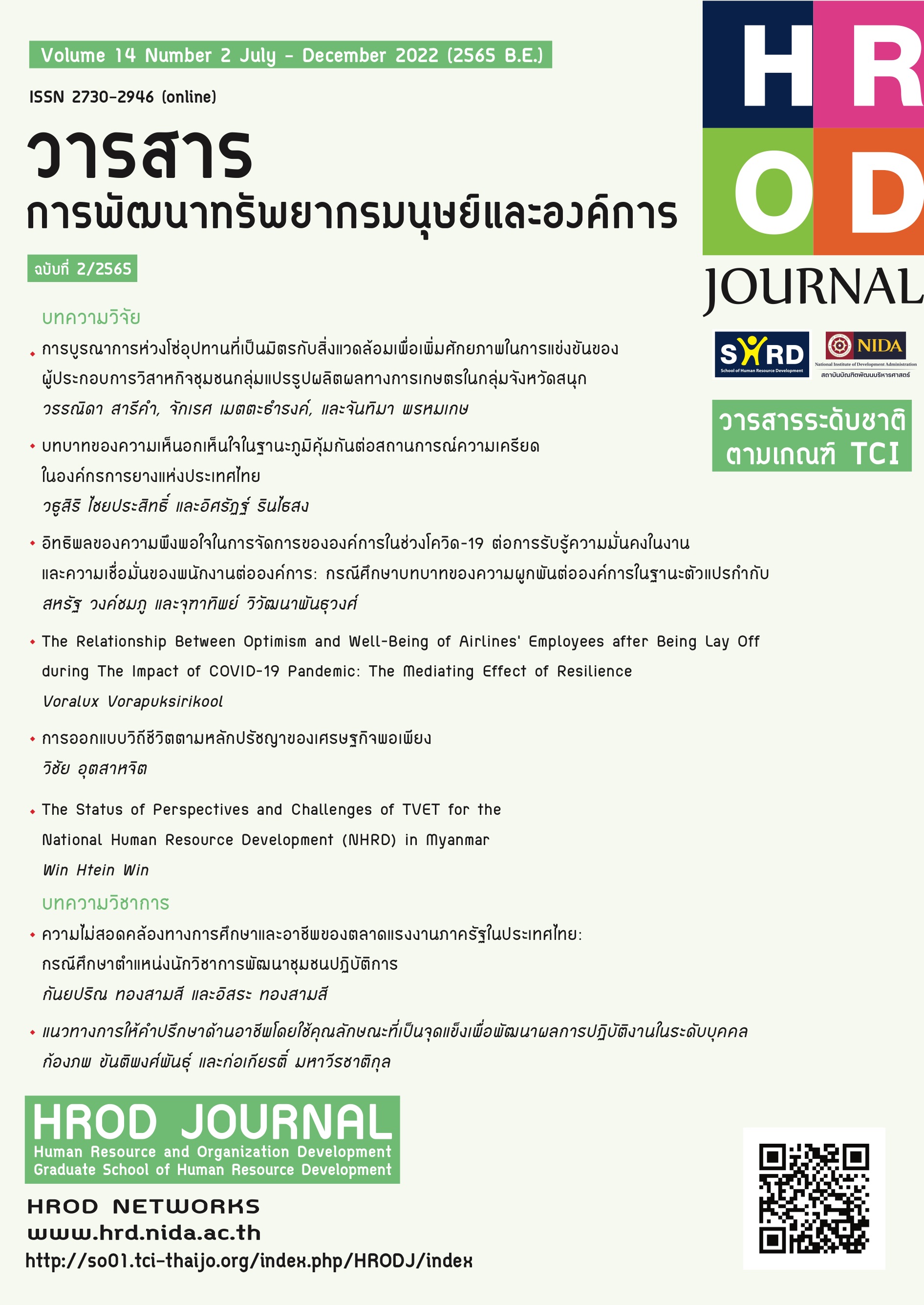Designing Ways of Living According to the Sufficiency Economy Philosophy
Main Article Content
Abstract
This research, titled “Designing ways of Living According to the Sufficiency Economy Philosophy,” had two main objectives, namely (1) to present the core concept of Sufficiency Economy and its application to ways of living, and (2) to explore the design of ways of living according to the Sufficiency Economy Philosophy. This qualitative research was conducted using KJ Method Brainstorming Technique to gather data from purposive groups of people who were working for Chaipattana Foundation in three projects and one office, namely (1) Academic Center for Agriculture, (2) Sudaduenpen Training Center, (3) Bhumirak Dhamachart Center, and (4) Office of Chaipattana Foundation with the total number of 42 persons which were grouped into 9 small groups during brainstorming.
Findings revealed that Sufficiency Economy Philosophy’s application to ways of living can be classified into the following 4 areas. The first area is “Life Principle/Beliefs” consisting of (1) adhering to moral, (2) not disturbing nor encroaching on self and others, (3) planning on way of living, and (4) being responsible for society and environment. The second area is “Living Daily Life” consisting of (1) taking good care of physical and mental health, (2) inhabiting and living appropriately, (3) commuting, (4) planning financially, and (5) developing own self continuingly. The third area is “Working/Earning a Living” consisting of (1) earning a living decently and honestly, (2) adhering to work principle and good practice, and (3) making decent and honest extra income. The last area is “Planning for the Future” consisting of (1) planning for living in the future, (2) planning financially, and (3) learning and developing own self. Lastly, the model of “House of Sufficiency Way of Living” was presented as a synthesized conceptual model.
Article Details

This work is licensed under a Creative Commons Attribution-NonCommercial-NoDerivatives 4.0 International License.
1) The content of article in HROD journal is the author’s wholly responsibility to research, analyze, summarize, compile, and reference data. The editorial department will not be responsible in anyway.
2) The submitted articles in HROD journal must be unpublished before and must not be currently under consideration for publication elsewhere. If it is detected for its repetition, the author must be responsible for infringement of copyright.
3) Authors will be asked to transfer copyright of the article to the Publisher. The article is prohibited to reproduce all or part of the text, unless allowed.
References
คณะอนุกรรมการขับเคลื่อนเศรษฐกิจพอเพียง สำนักงานคณะกรรมการพัฒนาการเศรษฐกิจและสังคมแห่งชาติ. (2548). เศรษฐกิจพอเพียงคืออะไร. ม.ป.พ.
มูลนิธิชัยพัฒนา. (ม.ป.ป.). เศรษฐกิจพอเพียง. สืบค้นจาก https://www.chaipat.or.th/publication/publish-document/sufficiency-economy.html
นัดพลพิชัย ดุลยวาทิต และมนต์ทนา คงแก้ว. (2563). การน้อมนำหลักปรัชญาเศรษฐกิจพอเพียงสู่การปฏิบัติของหัวหน้าครัวเรือน เพื่อยกระดับสู่การเป็นหมู่บ้านเศรษฐกิจพอเพียงต้นแบบ กรณีศึกษาตำบลเกาะยอ อำเภอเมืองสงขลา จังหวัดสงขลา. วารสารบริหารธุรกิจเทคโนโลยีมหานคร, 17(2), 130-154.
วิชัย อุตสาหจิต. (2560ก). การพัฒนาภาวะผู้นำในองค์การ [เอกสารประกอบการเรียนการสอนวิชา พอ. 7116 การพัฒนาภาวะผู้นำในองค์การ]. คณะพัฒนาทรัพยากรมนุษย์, สถาบันบัณฑิตพัฒน บริหารศาสตร์.
วิชัย อุตสาหจิต. (2560ข). เพียรธรรมตามคำพ่อสอน. โรงพิมพ์แห่งจุฬาลงกรณ์มหาวิทยาลัย.
วิชัย อุตสาหจิต. (2562). นำตนก่อนนำคนอื่น: สภาวะผู้นำที่จริงแท้ (พิมพ์ครั้งที่ 2). บริษัท ไซเบอร์ พริ้นท์กรุ๊ป จำกัด.
วิชัย อุตสาหจิต, นันทา สู้รักษา และดาวิษา ศรีธัญรัตน์. (2560). การศึกษาภาวะผู้นำตามหลักปรัชญาของเศรษฐกิจพอเพียง [เอกสารประกอบการสัมมนา]. งานสัมมนาวิชาการประจำปี 2560, ศูนย์ศึกษาการพัฒนาที่ยั่งยืนและเศรษฐกิจพอเพียง, สถาบันบัณฑิตพัฒนบริหารศาสตร์.
สำนักงานคณะกรรมการพัฒนาการเศรษฐกิจและสังคมแห่งชาติ. (2547). ตัวอย่างเศรษฐกิจพอเพียงที่ข้าพเจ้ารู้จัก. บริษัท วี.พี. กราฟฟิค แอนด์ พริ้นติ้งจำกัด.
สุเมธ ตันติเวชกุล. (2549). หลักธรรม หลักทำ ตามรอยพระยุคลบาท (พิมพ์ครั้งที่ 15). โรงพิมพ์ด่านสุทธาการพิมพ์.
ศศิวิมล วีระสัมฤทธิ์ และโกวิทย์ กังสนันท์. (2561). การรับรู้และประยุกต์หลักปรัชญาเศรษฐกิจพอเพียงของประชาชน ในตำบลบางเลน อำเภอบางใหญ่ จังหวัดนนทบุรี. วารสารรัชต์ภาคย์, 12(26), 385-397.
Avery, C. G., & Bergsteiner, H. (2016). Thailand: An unexpected role model. In C. A. Gayle & B. Harald (Eds.), Sufficiency thinking: Thailand’s gift to an unsustainable world (pp. 3-14). Allen & Unwin.
IdeaConnection. (2016). KJ method. Retrieved from https://www.ideaconnection.com/ thinking-methods/k-j-method-00011.html
Wiboonpongse, A., & Sriboonchitta, A. (2016). The impact of sufficiency thinking on community development. In C. A. Gayle & B. Harald (Eds.), Sufficiency thinking: Thailand’s gift to an unsustainable world (pp. 92-109). Allen & Unwin.


